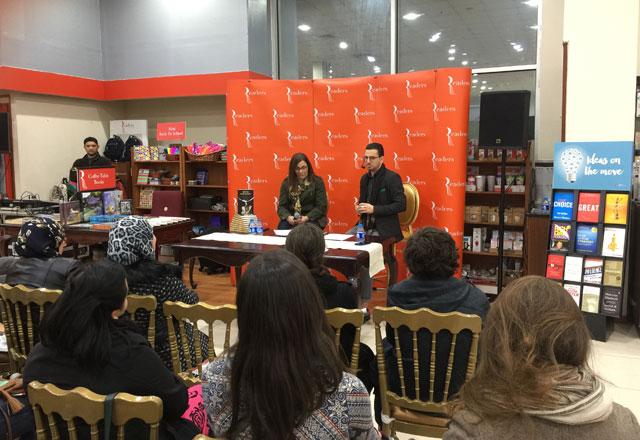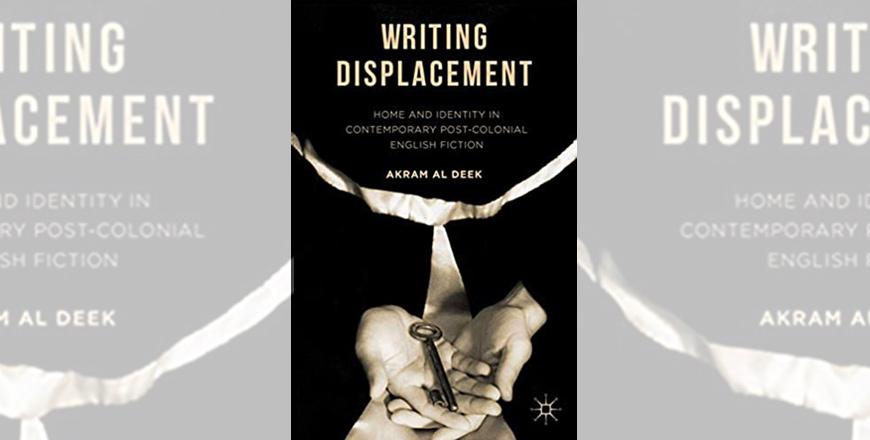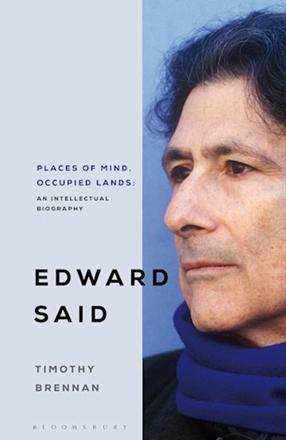You are here
Book says ‘displacement an opportunity for creativity, growth’
By Dana Al Emam - Mar 16,2017 - Last updated at Mar 16,2017

Akram Al Deek (right) discusses his new book ‘Writing Displacement’ at the launch event at Readers bookshop earlier this week (Photo by Dana Al Emam)
AMMAN — While modernist writers often associated displacement with loss and melancholic nostalgia, contemporary writers relate the same experience as an opportunity for creativity and growth, according to author Akram Al Deek.
In his newly-launched book “Writing Displacement”, Deek discusses displacement as a positive and enriching experience of the “translated” individual, whereby the displaced are aware of two sides of the world, not just one.
In an interview with The Jordan Times earlier this week on the sidelines of his book launch, Deek, an assistant professor of world literatures at the American University of Mababa (AUM), argued that displacement allows the displaced a critical distance and an aesthetic perspective, which are necessary to harness the creative mind.
The question is not “Who am I?” but “What can I become?”, he said.
The book uses the lens of the Palestinian exile to study the development of the politics of home and identity among migrants after World War II, particularly from 1945 to 2005. Subtitled “Home and Identity in Contemporary Post-Colonial English Fiction”, it highlights intersections with the Caribbean, Indian, African, Chinese and Pakistani displacement experiences.
“I focus on the local experience of the Palestinians, which has been expanded to involve other parts of the region, including the Iraqis, the Syrians and the Sudanese,” he said in the interview, citing wars as major causes of displacement.
The author, who is also the vice dean of the Faculty of Languages and Communication and head of the Department of English Language and Literature at the AUM, noted that the book argues that identity is “fluid and flexible”, not fixed.
Deek reflected on his own experiences of displacement: he was born in Jordan, holder of German nationality, with both of his parents exiled from Palestine in 1948 and 1967. In addition, his identity expanded further when he studied in England, he said.
“I feel sorry for our generation because the concept of home is lacking… we have so much passion for this concept, yet it is absent,” Deek said, adding that the concept of home has witnessed drastic changes, particularly among the second and third generations.
The book also discusses nationalism, arguing that there is a “very thin” line between nationalism and racism.
“It is not being; it is about becoming,” he concluded.
The book, which was launched at Readers Bookshop, delves into post-colonial studies, cultural theory and world literatures, and investigates the politics of home and identity.
The publication employs contemporary fiction to answer questions on what displacement is and on the difference between exile, travelling and expatriation. The book also discusses the relation between nostalgia for the past and the present, and the concept of the “homeland”.
Related Articles
Writing Displacement: Home and Identity in Contemporary Post-Colonial English FictionAkram Al DeekLondon: Palgrave Macmillan, 2019Pp.
Much has been written about Edward Said, but this is the first comprehensive biography in English of the renowned scholar, covering his personal, professional and political life. The author, Timothy Brennan, teaches in the humanities at the University of Minnesota and has written several scholarly books on world literature, making him well-informed on subjects close to Said’s heart. Brennan is obviously an admirer of Said but the book does not simply sing his praises. Rather, it is a critical review of the development of his thinking, writing, and influence over the years.
“Syria Speaks” is a compilation of personal narratives, short fiction, essays, poetry, song lyrics, posters, art works and photos that express the thinking and experience of the democratically-minded Syrians who sparked the initial nonviolent phase of the 2011 uprising, before it was overtaken by regime brutality and religious extremists.

















